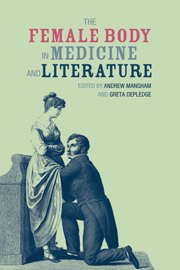Book contents
- Frontmatter
- Contents
- Acknowledgments
- Notes on Contributors
- 1 Introduction
- 2 ‘Difficulties, at present in no Degree clear'd up’: The Controversial Mother, 1600–1800
- 3 Monstrous Issues: The Uterus as Riddle in Early Modern Medical Texts
- 4 Surveilling the Secrets of the Female Body: The Contest for Reproductive Authority in the Popular Press of the Seventeenth Century
- 5 ‘Made in Imitation of Real Women and Children’: Obstetrical Machines in Eighteenth-Century Britain
- 6 Transcending the Sexed Body: Reason, Sympathy, and ‘Thinking Machines’ in the Debates over Male Midwifery
- 7 Emma Martin and the Manhandled Womb in Early Victorian England
- 8 Narrating the Victorian Vagina: Charlotte Brontë and the Masturbating Woman
- 9 ‘Those Parts Peculiar to Her Organization’: Some Observations on the History of Pelvimetry, a Nearly Forgotten Obstetric Subspeciality
- 10 ‘She read on more eagerly, almost breathlessly’: Mary Elizabeth Braddon's Challenge to Medical Depictions of Female Masturbation in The Doctor's Wife
- 11 Mrs Robinson's ‘Day-book of Iniquity’: Reading Bodies of/and Evidence in the Context of the 1858 Medical Reform Act
- 12 Rebecca's Womb: Irony and Gynaecology in Rebecca
- 13 Representations of Illegal Abortionists in England, 1900–1967
- 14 Afterword: Reading History as/and Vision
- Index
2 - ‘Difficulties, at present in no Degree clear'd up’: The Controversial Mother, 1600–1800
- Frontmatter
- Contents
- Acknowledgments
- Notes on Contributors
- 1 Introduction
- 2 ‘Difficulties, at present in no Degree clear'd up’: The Controversial Mother, 1600–1800
- 3 Monstrous Issues: The Uterus as Riddle in Early Modern Medical Texts
- 4 Surveilling the Secrets of the Female Body: The Contest for Reproductive Authority in the Popular Press of the Seventeenth Century
- 5 ‘Made in Imitation of Real Women and Children’: Obstetrical Machines in Eighteenth-Century Britain
- 6 Transcending the Sexed Body: Reason, Sympathy, and ‘Thinking Machines’ in the Debates over Male Midwifery
- 7 Emma Martin and the Manhandled Womb in Early Victorian England
- 8 Narrating the Victorian Vagina: Charlotte Brontë and the Masturbating Woman
- 9 ‘Those Parts Peculiar to Her Organization’: Some Observations on the History of Pelvimetry, a Nearly Forgotten Obstetric Subspeciality
- 10 ‘She read on more eagerly, almost breathlessly’: Mary Elizabeth Braddon's Challenge to Medical Depictions of Female Masturbation in The Doctor's Wife
- 11 Mrs Robinson's ‘Day-book of Iniquity’: Reading Bodies of/and Evidence in the Context of the 1858 Medical Reform Act
- 12 Rebecca's Womb: Irony and Gynaecology in Rebecca
- 13 Representations of Illegal Abortionists in England, 1900–1967
- 14 Afterword: Reading History as/and Vision
- Index
Summary
Early modern interest in conception, pregnancy and labour extended far beyond medical specialists: Audrey Eccles' study of the literature in the period 1540–1740 shows that ‘The public was evidently fascinated by the subject’. Lisa Forman Cody continues the story through the eighteenth century, noting that ‘tales of the body and birth, both normal and strange’ are plentiful ‘across genres, disciplines and locations’. Discourses associated with various professions interacted vigorously in discussions of two controversial issues: the child's inheritance from mother and father at conception, and the power of the mother's imagination to affect the child in her womb. Matters became even more heated when pregnancy reached its end: not only were there interdisciplinary debates about the best means of bringing the mother's labour to a successful conclusion, and how much of the work was being done by the baby, but the pressure of changing practices upon professional boundaries occasioned complex negotiations, and sometimes fierce rivalries, between physicians, apothecaries, surgeons, and midwives both male and female. Furthermore, in the competitive atmosphere of the period, some practitioners felt it necessary to conceal their most effectual equipment, and occasionally incurred reproaches, not for being unprofessional, since the word was not yet being used in an appropriate sense, but for failing to be proper gentlemen, which meant much the same thing. Meanwhile, the whole area was patrolled by poets, novelists and satirists, whose response illuminated ethical and emotional concerns, some of which are still relevant to the place of science within society.
- Type
- Chapter
- Information
- The Female Body in Medicine and Literature , pp. 16 - 33Publisher: Liverpool University PressPrint publication year: 2011



